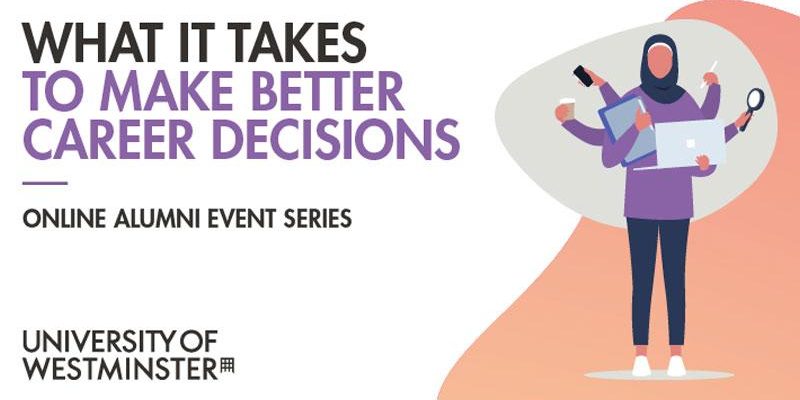 In March this year, alumnus Yashraj Jain (MA Applied Market and Social Research, 2011) spoke to our students and recent grads at a What it Takes event. He shared experiences from his own career journey, and offered advice based on all he has learned as an international graduate and experienced Market Researcher about making the right career decisions.
In March this year, alumnus Yashraj Jain (MA Applied Market and Social Research, 2011) spoke to our students and recent grads at a What it Takes event. He shared experiences from his own career journey, and offered advice based on all he has learned as an international graduate and experienced Market Researcher about making the right career decisions.
Following the event, many of our students and recent graduates had additional questions about pursuing graduate roles. Here, Yashraj has answered each of these questions as a follow-up Q&A.
You can now watch a full recording of the event here, or find out more about the What it Takes event series on our webpage.
Q: What if the career you want to do is actually a mixture of various things from different areas? Do you think it’s possible, and to what extent should we rush with gaining more skills and experience over the time we are at uni?
A: My recommendation would be to prioritise the various things. Most careers will require a group of skills covering different areas, but the level of proficiency for these areas will be different. So list down the various areas that come to mind, rank your top three and then ask yourself if these are also the most important ones from the list. Start building these skills first. Once you do get into your first role, you will then be able to learn the other areas of work on the job.
Personally, I’d try and learn as many as possible. It can get tricky though if you don’t follow a process. Building on what I mentioned above, you need to go in there with a priority list of careers that directly relate to your chosen field of study and that will directly impact your future job prospects. Get these skills first. A great place to start looking for what these skills might be is a competency model or framework for your subject, sector, industry or area of work.
Q: Do you think it makes sense to use University to learn areas you are bad at and keep the topics you enjoy for self-education in your free time?
A: From my personal experience, you may have picked up that I did exactly that. But even though I took up something I was bad at, it wasn’t something that I hated. It was still of interest, just that it didn’t come naturally to me and so I decided to undertake formal education training to learn more about it. Topics that are related things that I love or have a natural inclination towards is something that I do pursue in my free time. Some free time to self-education and some time to do nothing at all. You have to keep that balance and not burnout. Autodidactism is a mantra that I live by, we are all constantly learning.
Q: As a graduate, how should I prioritise between applying for job roles or starting my own business? Because ultimately I want my own business.
A: If you have a solid business plan, have vetted it with experts, mentors or tested its viability and if you are totally passionate and committed to it, I would say go for your business. The earlier you start the more you can learn and the more chances you can take.
Having said that, do keep in mind that a solid core foundation is needed to ensure you succeed in your business in the long term and a lot of that comes from formal education and learning on the job in your early career roles. There are some skills and business processes that you will only really get a feel for once you work in a business environment, like leading people, understanding business finances, getting your head around the legal side of things, strategy development and planning – to name a few. So some work experience while you are studying can help you gain some of that experience.
Q: How can we tell which work opportunities are legitimate? Particularly during COVID when the whole recruiting process is usually online.
A: Check if they have a website, and that it is a secure one (https:// – must have the padlock sign). Check if they have reviews on Glassdoor or similar. Check if the role is also listed on more than one jobs board online. Check if the company has a LinkedIn page and any if it has any ‘people’ listed as employees on LinkedIn. If it is a limited company, check if it is listed on Companies House. At any point if you have a concern, raise it, talk to someone you can trust and get a second or third opinion if you do feel that the role or the company feels odd or asks you to commit to any unreasonable demands. Only sign the papers once you are 100% sure. If it is not convincing enough, don’t apply and don’t pursue it. (Do note, this is in no way legal advice, just some common sense points I’d keep in mind if I am in doubt.)
Q: How difficult or risky is it to switch a career path in terms of a procedure, for example doing additional studies and entering a new environment?
A:The short answer is, it depends. I have a friend who became a pilot after completing their undergraduate studies in commerce. Another one who pursued medicine after working as a teacher for 10 years. So it all depends on how big a shift it is, what your proficiency is in terms of the core skills required to take up the new career and the amount of time, money and resource that may go into bridging that gap from one career to another.
Q: Can a 45 year old still find a job in the business field such as marketing?
A: ABSOLUTELY YES!
Q: I’ve hit a roadblock since graduating, do you suggest going back to do my masters or trying to gain more experience in the field. My degree is in international relations and development.
A: If the Masters will help you overcome the roadblock in question, then yes. If getting more experience will dilute the roadblock then get that first. Or do a part time masters and try to get some work experience alongside that – hoping a combination of the two should help remove the roadblock so you can progress to the next stage.
Q: A lot of graduates are struggling to find work due to a lack of experience in the field they’re applying for. Most jobs require at least a year of experience in the same field, which a lot of recent graduates don’t have. What advice would you give them?
A: This is a constant problem. I encountered this when I applied for jobs too. One technique that helped was really sitting down and jotting down ‘your story’. And while you do that think about what aspects of that story match with the required experience listed in the job role. When I applied for the role at the Royal Household, mind you, it was four years after I completed my Advanced Diploma in Travel and Tourism. I had to really go down memory lane and articulate why the skills I had matched the role, that I had experience from having done internships in the tourism sector, that the travel projects I undertook also provided me with a good understanding of what a tourism product is and how it should be packaged and sold. So what I am trying to say is, if you really think through each aspect of all that you have done, you will be able to find some overlap and crossover of skill sets. And some of them will help illustrate that you do have some experience in the field.
Q: Have you ever dealt with challenges in the job search that come with requiring visa sponsorship? If yes, how did you overcome it?
A: When I graduated, the UK government granted a post-study work visa valid for two years after graduation. Which meant that one could work for an employer without the need for the employer’s sponsorship. This also meant that if you did get into a role, after two years, when you would need sponsorship, you’d have already been working in the company for 1-2 years. Many companies prefer to invest in current staff than hire new ones, the cost of replacing an experienced employee is much more than retaining them. I’ve had two employers who not only sponsored a visa but also applied to become sponsors. The post-study work visa was discontinued but I think it is making a comeback soon.
In the absence of a post-study visa or similar, I would recommend doing what any student should do regardless of visa requirements or not. Find out what employment rules are for students during and out of term time, assess if you can take up a role (part-time, internship, voluntary) and get experience while you study. But again, remember to not spread yourself too thinly, your first priority should be to complete your degree well, not just in terms of marks but in terms on what you learn during those three years.
Lastly, you may want to also look at the UK governments list of sponsors and find out if any of them have vacancies. It will take some manual effort though. I am still waiting for a recruiting company to jump onto this business idea and start a website with job listings from UK sponsor companies only. If you do find one, please share! (Again this is in no way legal advice, just some tips that come to mind when looking for roles as an international student.)
Q: Is it a bad decision to first work for a while (see what you want to do) before doing masters?
A: Not at all. I think that would be wise. Maybe a year or so, which should be enough time for you to work and get an idea of what specialism you want to get into. However, it could also be that you realise you actually don’t need to study further at all. So keep your options open. Only do a Masters if it adds value to your career, whether it is progressing in your current role, moving roles in the same sector or shifting careers (like I did!).
- Peter’s Blog to Alumni - 27 January2026
- Could you mentor a Computer Science student this February and March? - 7 January2026
- India Alumni Survey Results - 27 October2025
